#Zelenetz
Explore tagged Tumblr posts
Text
Marc Spector: based on a real guy?
I would like to propose Barney "Beryl" Ross (born Dov-Ber Rasofsky) (1909-1967) as a stand-in for possible Marc Spector inspiration or at least a REALLY odd coincidence. The parallels are outstanding.
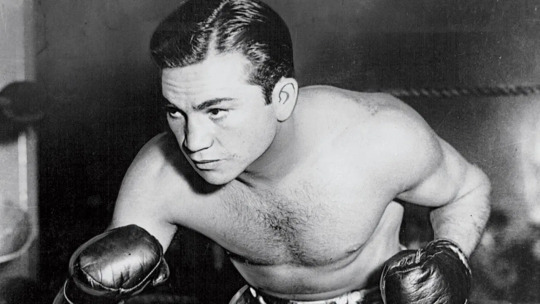
Born to Eastern European Immigrant parents (From Belarus), he grew up in a tough Chicago neighborhood.
His father was a Rabbi who looked down on fighting like Boxing and Wrestling.
When Barney expressed interest and talent in boxing, his father told him to "Let the goyim be the fighters" and that "The trombeniks (yiddish for phony and self aggrandizer), the murderers--We are the scholars."
Barney studied the Talmud as well and expressed interest in becoming a teacher.
His father was murdered when someone robbed their family vegetable shop. His mother suffered a mental breakdown and his three younger siblings were sent to an orphanage when Barney was just 14.
Barney became a thief, a gambler, and worked for Al Capone. He eventually found his money in boxing where it is speculated that Al Copone himself often promoted his shows and bought up the tickets to help him make money.
He used the money to reunite his family.
His career took off during the rise of Antisemitism and while Barney rejected his father's teachings and religion, he understood that he was seen as a "scrappy Jew Kid" and he needed to become a representative for his people.
His walk into the ring song was "My Yiddishe Momma" and he often wore blue and white with the Magen David on his clothes.
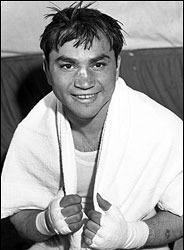
In the ring himself, he became a world champion in three weight divisions. He was never knocked out.
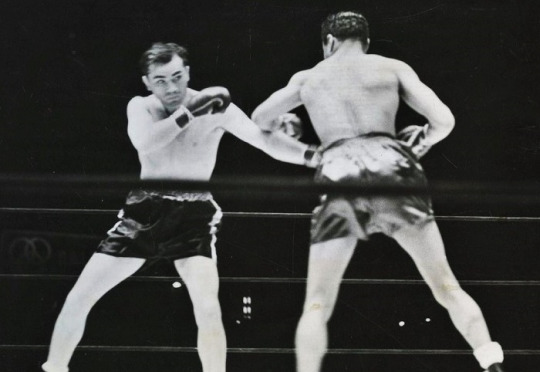
His last match before he retired he went 15 rounds where he took a severe beating. His couch begged him to call it, but he refused to go down. He was determined to leave the ring on his own feet". He had 72 wins in his career, 22 of which were by K.O.
When WWII broke out, he joined the Marines. Because of his stardome, they tried to keep him as just a pretty poster face recruit, but he insisted on fighting.
He was almost court-martialed when his commanding officer called him a Jewish Slur and he punched him out. He was spared because the judge was also jewish.
Barney was sent to the Pacific Theater and fought at Guadalcanal where he single handedly fought off no less than five armed Japanese soldiers after being shot. He then rescued his fellow soldier by carrying them to safety. He was awarded the Silver Star.
Despite his complicated relationship with his religion, he was known for bringing his father's religious study books with him to training camp.
In the war, he made friends with a catholic priest who invited him to Christmas Dinner. Barney could play the pipe organ and he provided music for the soldiers. When asked to play something Jewish, he played "My Yiddishe Momma" that left everyone in tears.
After his wounds healed, he developed a morphine addiction that he went to rehab for and eventually recovered. He went to schools and campaigned about the dangers of drug abuse.
He worked hard for the creation of a Jewish State and offered to lead a brigade of Jewish American Veterans.
The Jewish Community saw him as a hero and with his back story, he fit the bill of superhero status.
A tragic backstory, rejection of his father's life and teachings, rising up out of the rough streets, becoming a fighter, and eventually a real life war hero and fighter for Jewish Rights.
(Check out his biography- Barney Ross: The Life of a Jewish Fighter, by Douglas Century and his autobiography No Man Stands Alone.)
Moench most certainly did not base Marc Spector off of Barney Ross. He didn't set about making the character obviously Jewish at first. It happened naturally for various other reasons.
But Moench also didn't give Marc his back story.
That would be Zelenetz.
Moon Knight Vol 1. Issue #37. Published 1984
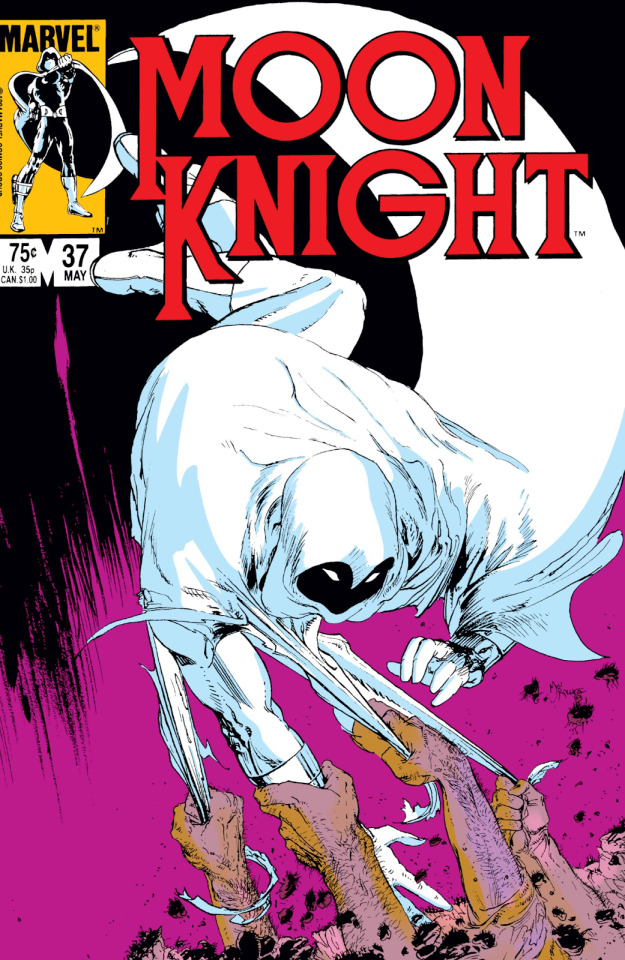
Writer: Alan Zelenetz
Artist: Bo Hampton
Cover Artist: Michael Kaluta

Now, I've broken this comic down before. HERE. But let's talk about the importance of THIS story.
You see, after the war, no one wanted to talk about the Holocaust. Most survivors didn't want to talk about what they had been through and most others liked to pretend that nothing happened.
It wasn't until the 90s that they came up with an actual mandate that it be taught in schools!
It wasn't until then that it suddenly became apparent that we needed to hear from the survivors and we needed to record the history before the first hand accounts were lost.
Until this time, the only stories being told were done in comics.
Early comics used it as a grotesque way to add in horror and action and violence. When the Comic book code of ethics stepped in (big shot guys that put down the law for swears being &#^$% and no sex and violence rating systems), then comic writers found 'creative' ways to use Nazi as the villain and ambiguously talk about their targets without mentioning their actual crimes or the people they targeted.
THAT would change when Spiegelman's Maus was published in 1980.
A keen observer will note the date Moon Knight Vol 1 came out. November 1980!
Now, Marc has fought Neo Nazi before and has even faced antisemitism. He's even gone to Jerusalem. But we have never had Marc connected to the Holocaust or explored his Jewish past before Zelenetz told this story.

“I grew up on the poor side of Chicago. My father was unconcerned with material things. ‘God loves a poor man.’ He’d say. ‘Poor in goods, rich in spirit.’”
Sounds familiar, right?

And while Marc is an extreme example, we see the conflict with the Rabbi father and the son who wants to fight.

In this same issue we see Moon Knight rescue a Rabbi and Torah from a burning synagogue that has a Swastika painted on the door.
Moon Knight hunts down the Nazi punks and makes them hurt.
In this issue and the next, we see Marc deal with his conflicted past regarding religion, his Rabbi father, and his choice to fight vs his father’s choice to ‘leave it to god’.
We also find out in this issue that the reason Marc joined the Marines is because of his father’s rejection.
"To become Moon Knight--A social conscience and moral force. Just, severe, unknowable."
I won't replay the comic for you guys, as I've already reviewed it (though I've learned a LOT since then and I'm sure I could bring more things to light at this point... Like the fact that to bring Elias back from the dead they write the Hebrew word Emet 'truth' on his forehead. Marlene erases part of the word, leaving behind Met, which is Hebrew for 'To Die' and this sends him back to his death).
In the ending issue, and last issue of Moon Knight’s first run, we are left with:
"I may have misjudged my father's saintliness for cowardice and his genius and moral zeal for fanaticism. [...] And isn't moon knight in his own way a moral zealot fighting perhaps for the very same values Marc Spector once rejected?"
Back to Alan Zelentez.
Alan only had Moon Knight for a few issues, but he was the first and as far as my limited research has shown me, the only actually Jewish writer to get to work with Moon Knight (I hope I am pleasantly surprised as I get further into things...but I'm not holding my breath).
Zelenetz fit a LOT of Jewish lore and fun snippets into this comic that only those that have studied Jewish folklore and the culture would easily pick out.
He was a Junior High School and High school principal at an Orthodox Jewish school in Brooklyn.
He worked as an editor, script writer, Judica advisor for film and helped get a few other comics started and established.
Now, is it likely that a Jewish man in Brooklyn heard about the son of a Rabbi from Eastern Europe in Chicago who turned into an amazing boxer and later a Marine war hero? Only Zelenetz knows for sure.
#Moon Knight#Moon Knight comic#Zelenetz#History of comics#History of Moon Knight#Comic history is Jewish history#Guess who is doing a lot of research lately into comic history!#Another reason Moon Knight is such an amazing comic for its early time#I wish we had more of Zelenetz#I'm still here people!#I've been so busy
67 notes
·
View notes
Text

Conan the King #20: The Prince Is Dead
by Alan Zelenetz; Marc Silvestri; Marie Severin/various; George Roussos and Rick Parker
Marvel
12 notes
·
View notes
Text

The Alien Legion No. 1, dated April 1984. Cover by Frank Cirocco with the logo designed by Walt Simonson. Epic Comics | Marvel.
#alien legion#1984#frank cirocco#carl potts#alan zelenetz#terry austin#epic comics#the alien legion#walt simonson
16 notes
·
View notes
Text

Thor #333 (Zelenetz/Bright, July 1983). Dracula’s new goatee and desire to turn established heroines into his undead brides is more dastardly than his original incarnation. Thor still wallops him, though.
13 notes
·
View notes
Text


Last page of Thor Annual #13 (December 1985), by Alan Zelenetz (script), John Buscema (pencils and inks), George Roussos (colours), and John Morelli (letters).
#thor annual#mephisto#john buscema#george roussos#alan zelenetz#john morelli#comics#comic art#splash page
16 notes
·
View notes
Text


Thor Annual #11 (1983)
#marvel comics#thor#alan zelenetz#bob hall#vince colletta#rick parker#carl gafford#mark gruenwald#loki
29 notes
·
View notes
Text
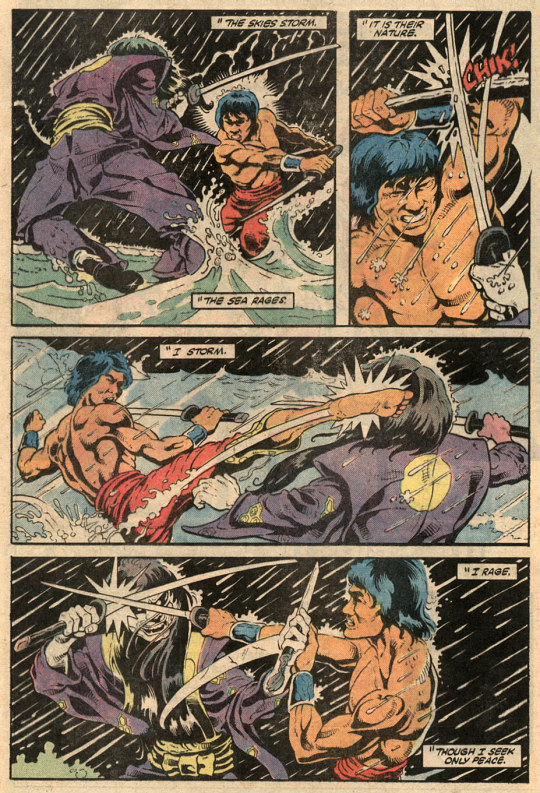
Page from Master of Kung Fu #125. 1983. Art by William Johnson and Mike Mignola.
71 notes
·
View notes
Text
GH: THOR #331
Another series that I had been buying for a long time simply out of rote was THOR, so it was a simple matter to put it on the chopping block during my necessary purge. If I’m honest about it, looking back, THOR was a series that suffered throughout the entirety of the 1970s. Jack Kirby had given it its spark for its formative years, but nobody who came after his departure seemed capable of…

View On WordPress
#Alan Zelenetz#Bob Hall#Jack Kirby#Jim Shooter#Marvel#Ron Frenz#Thor#Tom DeFalco#Vince Colletta#Walt Simonson
24 notes
·
View notes
Text
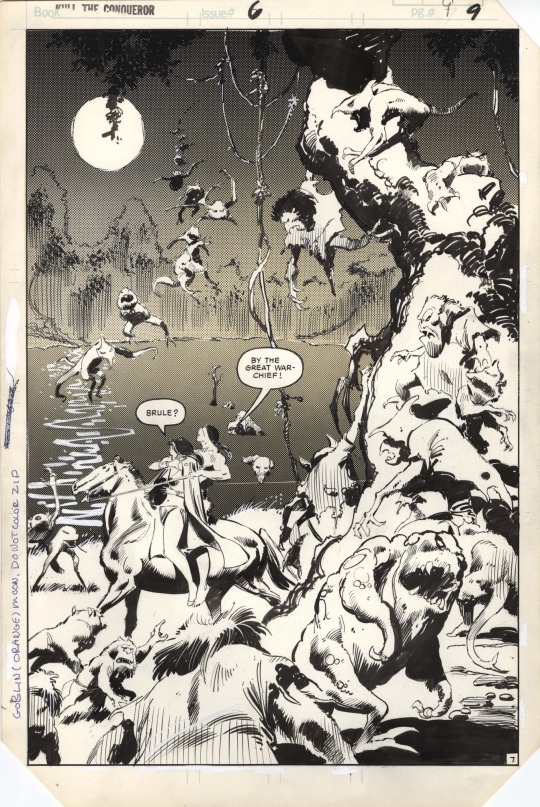

Kull the Conqueror, Vol. 3 # 6 Page 07 by John Buscema, with Inks and Colors by Klaus Janson, Letters by John Morelli, and a Script by Alan Zelenetz.
#Kull the Conqueror#Splash Page Process#Splash Page#Process#Master Class#John Buscema#Klaus Janson#John Morelli#Alan Zelenetz#Marvel Comics#Marvel#Comics#Art#Illustration
33 notes
·
View notes
Text
Samantha Reads Comics: Marvelgrafx-16 #2


I feel that, fr

fuckin OWNED

Hela's design here is the one trace of Kirbyism in a GN that's otherwise independent of the established Marvel version of Asgard, yeah?

EXTREMELY good panel
yeah that one ruled! did not expect to like it nearly as much as I did!
#samantha reads comics#comics#marvel comics#comics liveblogging#liveblogging#marvel#alan zelenetz#norse mythology#charles vess
2 notes
·
View notes
Text
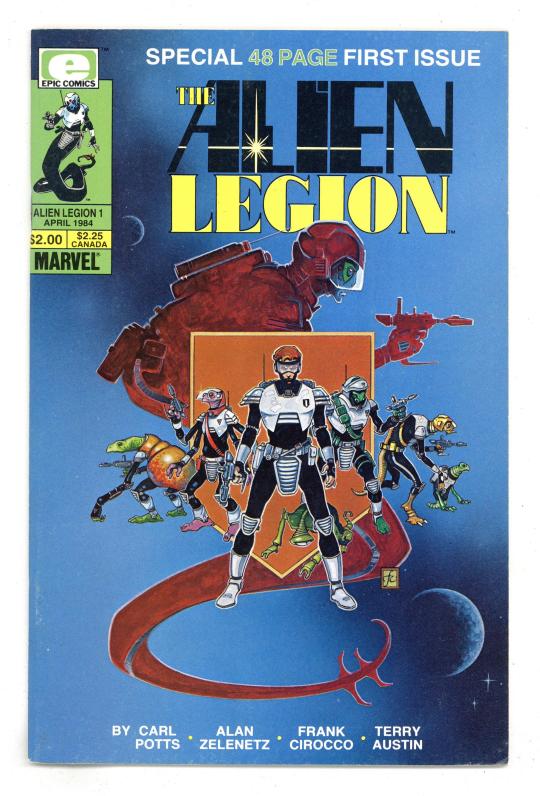
On this date in 1984, Marvel released the first issue of Alien Legion by Carl Potts, Alan Zelenetz, Frank Cirocco and Terry Austin through their Epic Comics imprint.
#alien legion#marvel#epic comics#comics to remember#comics#comic books#carl potts#alan zelenetz#frank cirocco#terry austin
5 notes
·
View notes
Text

Bizarre Adventures #32: Sea of Destiny
by Alan Zelenetz and John Bolton
Marvel
27 notes
·
View notes
Text

Marvel Graphic Novel: The Alien Legion - A Grey Day to Die, 1986. Below is the back cover and an ad that appeared in other comics of the Epic Comics line. Epic Comics | Marvel.


#carl potts#alan zelenetz#frank cirocco#terry austin#steve oliff#alien legion#1986#epic comics#the alien legion
8 notes
·
View notes
Text

Thor #336 (Zelenetz/Chan, Oct 1983). Sif finally realizes Thor loves Midgard more than her, and dumps him to return to Asgard.
9 notes
·
View notes
Text
You can tell Zelenetz (author of Moon Knight #18, #21–22, #27, #32, and #35-38, who made the character canonically Jewish) used to be a Jewish teacher because the story in #37-38 sounds exactly like a folk tale they'd tell at the religious school program I went to as a kid (minus some of the violence/explicit generational trauma probably).
Complete with the themes of "everyone should have access to education" and "protecting your community" and the end, which was a clever wordplay on the one letter difference between the Hebrew word for "truth" and "death".
What I'm saying is Zelenetz is a nerd.
6 notes
·
View notes
Text
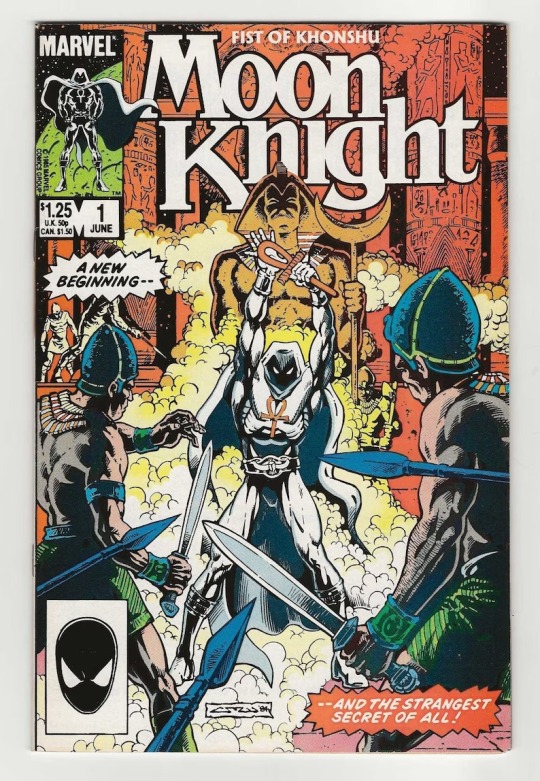
https://www.etsy.com/.../moon-knight-vol-2-1-copper-age... NM- Moon Knight 1, regularly $20.00, on sale through the link until 5/15 for $18.00
#moon knight#marc spector#alan zelenetz#chris warner#marvel comics#comics#comic books#comics for sale
9 notes
·
View notes